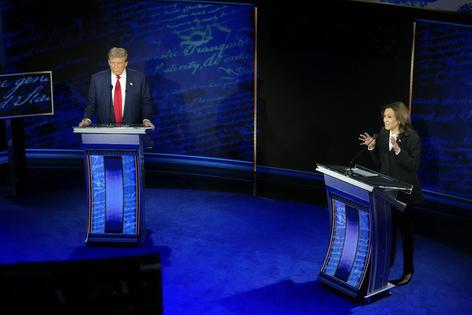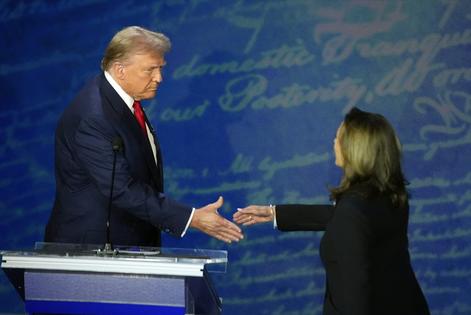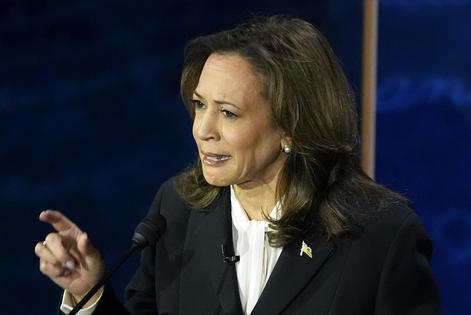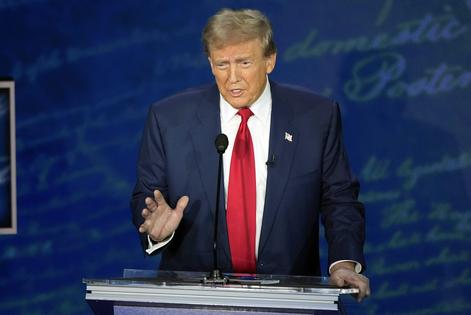Starting with a handshake, presidential debate between Harris and Trump then turns fierce, and pointed
Published in Political News
As the two presidential candidates entered the debate stage, Kamala Harris strode across it and offered her hand to Donald Trump to shake, setting a confident tone that didn’t flag throughout the debate.
Trump, appearing to grow angrier through the night, stuck to his well-trodden themes of American decline and reminded viewers that Harris was part of the Biden administration, which he blamed for that decline.
Each candidate probably won points with their supporters – whether they won over undecided voters will become clear when the ballots are counted. The Conversation U.S. asked two scholars, Miami University sociologist Rodney Coates, an expert on race, and Lee Banville, a 13-year veteran of the PBS NewsHour and now director of the School of Journalism at the University of Montana who has written a book on presidential debates, to respond to what they heard in the debate.
Rodney Coates, Professor of Critical Race and Ethnic Studies, Miami University
From the very opening of the presidential debate, Kamala Harris made clear her vision of a more just society while at the same time directly challenging Donald Trump’s controversial views on abortion, immigration and the U.S. legal system.
“I’m about lifting people up and not beating people down,” Harris said.
A former prosecutor, Harris repeatedly used Trump’s own words and past behavior to attack his chaotic first administration. In response, Trump resorted to personal attacks, calling Harris “the worst vice president in the history of our country,” and said she had no ideas except for those of her boss, President Joe Biden.
But after listening to Trump’s frequent personal attacks against Biden, Harris finally snapped. “You are not running against Joe Biden,” Harris said. “You are running against me.”
Noticeably absent from Trump’s first face-to-face meeting with Harris were his racist attacks against her. Since Biden dropped out of the race in July 2024 and Harris became the Democratic nominee, Trump has described Harris as having “a low IQ,” “dumb as a rock,” “weak” and “lazy.”
For most of the debate, Trump avoided this line of attack, but he could not avoid repeating a debunked myth that Haitian immigrants in Ohio were killing and eating pets. But when asked about Harris’ racial identity, Trump said he didn’t care what she was.
“I read where she is not Black … then I read that she was Black,” Trump said. “That’s up to her.”
Critics have accused Trump of putting racist attacks at the center of his campaign strategy.
But Harris said there was no place for such a racially divisive strategy.
“It’s a tragedy,” Harris said. Trump, she said, “has consistently over the course of his career attempted to use race to divide the American people. … I think the American people want better than that.”
Lee Banville, Professor and Director of the School of Journalism, University of Montana
Often these spectacles of American politics come down to some memorable moment – a rhetorical jab that bloodies an opponent, an unforced error that dogs a campaign for weeks. The first 30 minutes of Biden’s performance in his June debate with Trump is just the latest in a long line of pivotal moments that can throw a campaign off.
But when does a fumbled phrase elevate into a political crisis or a factual slip turn into lost votes? And what from tonight’s historic encounter will merit more than a couple of TikToks making fun of politicians?
We should know in the next day or so, but one may be when Trump claimed that ending the constitutional protection for abortion in Roe v. Wade had returned the issue to the states – a move, he said, “Every legal scholar, every Democrat, every Republican, liberal, conservative, they all wanted this issue to be brought back to the states where the people could vote. And that’s what happened.”
Harris then turned that phrase “what people wanted” back on the former president.
“You want to talk about this is what people wanted? Pregnant women who want to carry a pregnancy to term suffering from a miscarriage, being denied care in an emergency room because the health care providers are afraid they might go to jail and she’s bleeding out in a car in the parking lot? She didn’t want that. Her husband didn’t want that. A 12- or 13-year-old survivor of incest being forced to carry a pregnancy to term? They don’t want that,” Harris said.
It was a moment of policy, but also a personal moment, and hit on a major theme of the race. That is the kind of moment we have seen stand out in the past: President Gerald Ford wrongly declaring Eastern Europe free of Soviet domination; President Ronald Reagan deftly dispatching concerns about his age with a well-placed quip about the youth and inexperience of his 56-year-old rival; President George H.W. Bush looking at his watch repeatedly during a 1992 town hall debate.
I was lucky enough to work on a 2008 documentary – “Debating our Destiny” – where the moderator of 12 presidential debates and my former boss, the late Jim Lehrer, interviewed many of those candidates about debates. The first President Bush was one of our favorites.
“You look at your watch and they say that he shouldn’t had any business running for president. He’s bored. He’s out of this thing, he’s not with it and we need change,” Bush told us later. “Now, was I glad when the damn thing was over. Yeah. And maybe that’s why I was looking at it, only 10 more minutes of this crap.”
Now, Bush might have been the funny one, but it was former President Bill Clinton who, after mulling it over, offered some good insight into why some debate moments stick: “The reason the watch thing hurt so badly was it tended to reinforce the problem he had in the election.”
Put another way, stories and moments that reaffirm a theme in the campaign that already is present in the minds of voters often resonate long after the lights dim.
So, now Americans will sit back and see what the echo chambers and cable outlets make of an exchange like the one on abortion. Will it fire up more women voters to back the Harris ticket or will it be lost in a sea of economic issues and immigration policy?
If Bill Clinton is right, the abortion back-and-forth will probably resonate if it connects to what voters already think about these candidates and what are the primary issues of this campaign.
This article is republished from The Conversation, a nonprofit, independent news organization bringing you facts and trustworthy analysis to help you make sense of our complex world. It was written by: Rodney Coates, Miami University and Lee Banville, University of Montana
Read more:
Bobbleheads, Magic 8 Balls, chairs and other artifacts in the Smithsonian reveal the historical significance of presidential debates
Politicians often warn of American decline – and voters often buy it
Lessons on wrangling candidates from the masterful moderator of presidential debates, Jim Lehrer
The authors do not work for, consult, own shares in or receive funding from any company or organization that would benefit from this article, and have disclosed no relevant affiliations beyond their academic appointment.




































































Comments